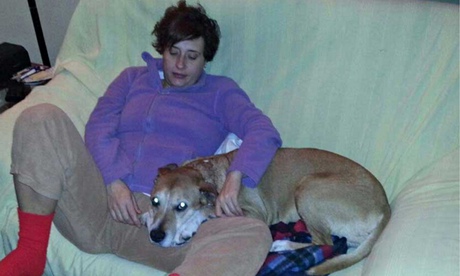Tests for virus come back negative for Teresa Romero Ramos, first person to contract disease outside west Africa

A Spanish nurse who contracted Ebola was on Tuesday given the all clear when health authorities said she no longer has any traces of the virus in her blood after more than two weeks in hospital
Several successive tests for Teresa Romero Ramos have come back negative, said José Ramón Arribas from Madrid’s Carlos III Hospital. “We consider that she has met the criteria for being cured,” he said, adding: “Patients with Ebola can be completely cured and live a normal life.”
She is expected to remain in hospital for at least two more weeks to recover. “It’s one thing to test negative for Ebola in the blood, and another to talk about what the virus has done to her,” said her doctor, Fernando de la Calle. Romero Ramos, 44, was treated with a serum containing antibodies from Ebola survivors and anti-viral drugs.
In early October Romero Ramos tested positive for Ebola, becoming the first known person in the current outbreak to contract the virus outside west Africa. The auxiliary nurse had been part of a team attending to two Ebola patients who had been evacuated from west Africa to Madrid for treatment.
After it emerged that Romero Ramos had been complaining of a fever for nearly a week before being tested for Ebola, health authorities began monitoring more than 80 people who had been in contact with her prior to her diagnosis. Fifteen people, including her husband and three workers from a hair salon where Romero Ramos went for an appointment in late September, remain in quarantine in Madrid’s Carlos III hospital. None have shown any symptoms to date.
On Tuesday, family friend Teresa Mesa said that the past few weeks had been incredibly trying for Romero Ramos and her family. “There was a moment when she thought she was going to die,” said Mesa. In an effort to not upset her during her recovery, her friends and family had not yet told her that her dog, Excalibur, had been put down.
In the tense weeks that followed the nurse’s diagnosis, healthcare workers spoke out about how ill-prepared the country had been to face the threat of Ebola.
On Tuesday, the association that represents nurses in Spain backed the claims with a report detailing what they saw as shortcomings in how authorities had managed the Ebola crisis.
“There were so many risk factors,” said Máximo González Jurado of the Consejo General de Enfermería. “But did authorities take all necessary measures to minimise these risks? Our report says they did not.”
Based on first-hand interviews with nursing staff at Madrid’s Carlos III hospital, the 148-page report paints a picture of scant training, missing protocols and substandard equipment. One nurse, just back from vacation, was put on the night shift to attend to a patient with Ebola with no training. Of the six nurses who treated one of the Ebola patients, only four had received 30 minutes of training. Just two of them had ever practiced putting on or taking off the protective equipment.
Staff was not trained on how to handle or dispose of any of the potentially infectious waste materials from the rooms. The two sanitary workers tasked with removing the body of one of the Ebola patients after he died from the virus were not given any special training.
The report also details various flaws in the equipment, from gloves that were shorter than required, goggles that fogged up and antiseptic that had to be replaced after it emerged that it could create small holes in the protective suits.
González Jurado pointed to these risks to refute the claim by Madrid health authorities that Romero Ramos may have contracted the disease by touching her face while still wearing her gloves. “We’ll never know how Romero Ramos was infected with Ebola.” He said that all of the information collected would be submitted to Spain’s general prosecutor, who is looking into how Ebola was managed in Spain.
